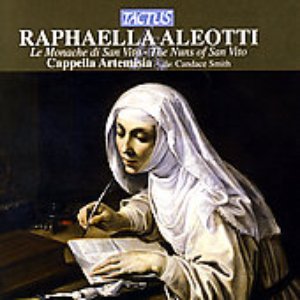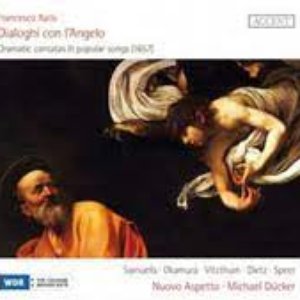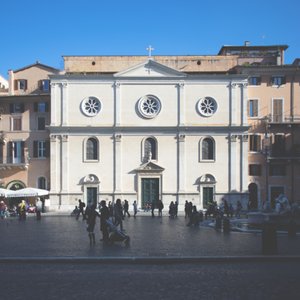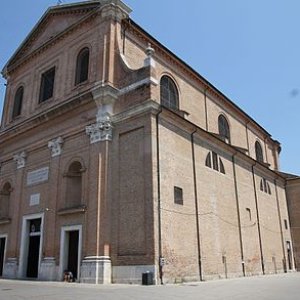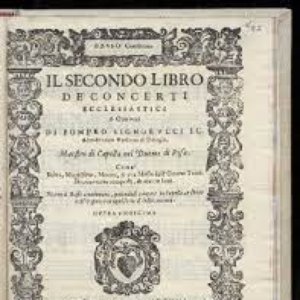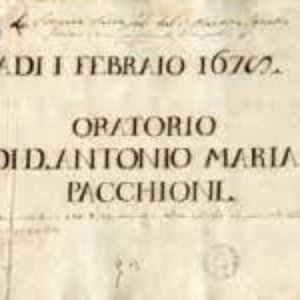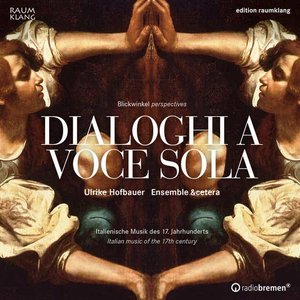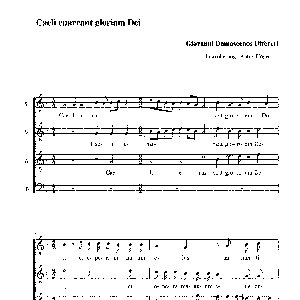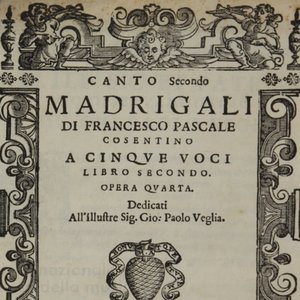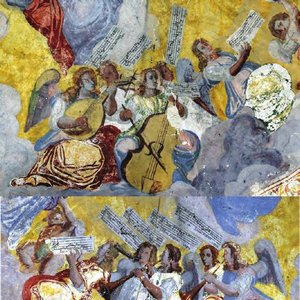Biography
Pietro Verdina (ca. 1600, Lonato — July 1643, Vienna).
He was born in Lonato, on the Brescia side of Lake Garda, on 19 September 1600 from Lodovico and his wife Saturnina (Lonato del Garda, Archive of the major church of S. Giovanni Battista, Baptized register , 1595-1629, c. 44v, No. 121).
The family must have been quite wealthy, since, with a document he had drawn up in Verona in 1623 (Paganuzzi, 1973), two of his brothers, Giovanni Battista and Antonio, gave him two rustic estates of considerable value located in Lonato, as a necessary patrimonial dowry. for obtaining major orders (which, moreover, he never seems to have taken, since he is later married with offspring).
The locality then belonged to the ecclesiastical and civil jurisdiction of Verona; the choice of the acolyte schools set up at the cathedral of Verona was quite obvious, especially since they enjoyed particular prestige in those years thanks to the didactic commitment of Stefano Bernardi. The primary purpose of the schools was to train singers and instrumentalists who could soon perform in the cathedral chapel: in fact, the first mentions of Verdina as a musician (cornetto player) come from the chapter registers of the Veronese mother church.
After the acolyte, from 1 August 1616 he was active as an instrumentalist (cornet player) in the musical chapel of the cathedral, regularly paid until mid-September 1620 (Paganuzzi, 1973, and 1976). In the meantime, four pieces by him (two motets and two instrumental "songs") had appeared in the collective of Bernardi's pupils, Lilia sacra octo de Veronensibus gymnasii acolytorum alumnis decerpta ternis vocibus modulanda(Venice 1618; the surname appears in the two forms Verdina and Vardina). The Veronese environment, and that of the cathedral in particular, had for some time maintained privileged relations with the princely chapels of imperial relevance, as well as with Vienna: various cantors and instrumentalists trained in the acolyte schools then found a place there and, on the contrary, active singers in those chapels were occasionally used in the cathedral of Verona. Verdina's last salary was recorded on 4 December 1620 with the notation "he left for Germany" (Verona, Biblioteca capitolare, Mensa acoliti , b. 504, 1620-30, f. , 1620-21, c. 36v).
The first occupation of Verdina beyond the Alps is not known. You may have followed Bernardi, already in 1622 in the service of Archduke Charles of Austria, Prince Bishop of Bressanone, then in 1624 in Salzburg in the service of the Prince Bishop, Paride Lodron. Even before 1627 he was an instrumentalist in the imperial chapel in Vienna (in this capacity he signed the will of a colleague; Saunders, 1995, pp. 228 f.). In 1631 he would have been at the head of the small musical chapel of the heir to the imperial throne, the future Ferdinand III (Weaver, 2012, p. 63; Seifert, 2017). He received notable gifts in 1640 and 1641 (Knaus, 1967, pp. 103, 110) and again in 1641 he acted as an intermediary with a fellow countryman for the installation of a mechanism for running water in an imperial palace in Hungary (cautiously the note specifies that the architect would be paid only if the machine "newly invented Had worked and had been properly installed; Saunders, 1995, p. 25). Punctual and explicit epistolary expressions in letters of Emperor Ferdinand III, an excellent connoisseur of music, testify to the high esteem in which his predecessor, Ferdinand II, also a melomaniac, had held Verdina, praising her musical abilities and competence (Sances, 2003). Given the numerous and various occasions on which the participation of musicians was required at court, Verdina's duties had to be multifaceted; he could therefore identify with the "young Veronese organist",
In 1637 Ferdinand III, who succeeded his parent on the imperial throne, did not fulfill his request to be elevated to chapel master - a position held since 1626 by Giovanni Valentini - despite having informally exercised his functions in the previous seven years. Nor was the request to establish a position of 'concertmaster' (ie instrumentalists) accepted: the sovereign only granted him an increase in salary (Knaus, 1967, pp. 42 ff., 87). In the same 1637 he took part in the expedition of musicians from the imperial court sent to Graz (Federhofer, 1967, p. 156).
He died in an unspecified place and date between the autumn of 1642 and the summer of 1643, following the second battle of Breitenfeld (November 2, 1642), unfortunate for the imperials. Archduke Leopold William, brother of the emperor and commander of the imperial army against the Swedes, had borrowed the musician to take him with him on the military campaign, but Verdina was taken prisoner. In a letter dated 11 November 1642 the sovereign expressed to the archduke the disapproval of the choirmaster Valentini for having wanted to expose musicians to the dangers of war, deprecating the fate of Verdina's wife, Margherita, and her children; and he reiterated his sorrow for the loss of such a good servant with a letter dated July 29, 1643 (Weaver, 2012).
With the exception of the four aforementioned early compositions, Verdina's music was received thanks to handwritten copies from the Viennese court but dispersed in more or less remote locations (Kremsmünster, Kroměříž, Lüneburg, Uppsala), the manuscripts having been largely lost seventeenth-century musical instruments in use in the imperial chapel. As for Valentini and then for Giovanni Felice Sances and Antonio Bertali, the 'festive' ecclesiastical production for large numbers - the genre in which Verdina excelled - was by its nature linked to the handwritten transmission: the high cost of printing such monumental compositions was not it could have been amortized by sales, given the forced limited circulation of scores that are so difficult and rare to perform. In some cases (as for the Sancti Georgii massesand Theophili ), to the already full-bodied ensemble planned by Verdina the copyists-arrangers who produced the copies added, enriching it, further 'stuffing' voices: for Missa Theophili , to the original parts (eight voices' in concert ', eight voices' of ripieno ', two violins, four violas, bassoon and violone), two cornets, two violins, a viola and four trombones were added, to form a total of eight vocal and instrumental groups.
The compositions currently attributable with certainty to Verdina are: four masses ( Purificationis , Longa et brevis , Sancti Georgii , Theophili ), a five-part compline, six-part litany , a five-part 'vespers' and continuo (with a solo voice different for each psalm, to which the remaining voices provide 'choral' support), scattered psalms ( Venite et videte opera Domini , Laudate Dominum in sanctis ejus ), Marian motets for various vocal and instrumental ensembles ( Ave Regina , Salve Regina ).
Although not very large, the production received allows us to evaluate its importance and results. It follows the trends already observable in the compositions of the imperial choirmaster Valentini and other musicians operating in the same circle. On the one hand it differs from contemporary Roman production for the intensive use of instruments (especially in the most sumptuous compositions), on the other from the Venetian one by virtue of a more accurate writing, which does not disdain to linger on occasion in passages in the 'ancient style' (or at the time considered as such), more sober and austere than the concertante style otherwise prevalent. The compositions intended for the special solemnities of the court, and therefore conceived for very large ensembles, envisage a large and varied instrumental group. Unlike Roman polychoral music,capella ) and groups of soloists, with more elaborate writing. The contrasts between the choirs are very close, so that the result is the impression of a real 'mosaic' of sounds, rather than a massive alternation (as in the compositions of Orazio Benevoli or other composers of the Roman or Venetian school); moreover, single voices or instruments detach themselves from the group for short contrapuntal passages, without them rising to full-blown solo prominence. The musical value of Verdina's compositions is however remarkable, in all respects worthy of the high standard of the imperial chapel.
Verdina's memory was not lost in Italy. In 1679 one of his countrymen, Stefano Pasini, in dedicating his Sonatas op. VIII (Venice) celebrates him for having "raised his music in the most sublime courts of Europe" to the point of being caressed by 'princes, courted and revered by' knights'. And again Antimo Liberati remembered him, together with Valentini and Bertali, among the "excellent composers and other famous musicians and singers" who came from Verona, active in his day (ie in the years 1637-43) at the court of Ferdinand III ( Letter in response to one of Mr. Ovidio Persapegi , Rome 1685, p. 52).
Artist descriptions on Last.fm are editable by everyone. Feel free to contribute!
All user-contributed text on this page is available under the Creative Commons Attribution-ShareAlike License; additional terms may apply.
